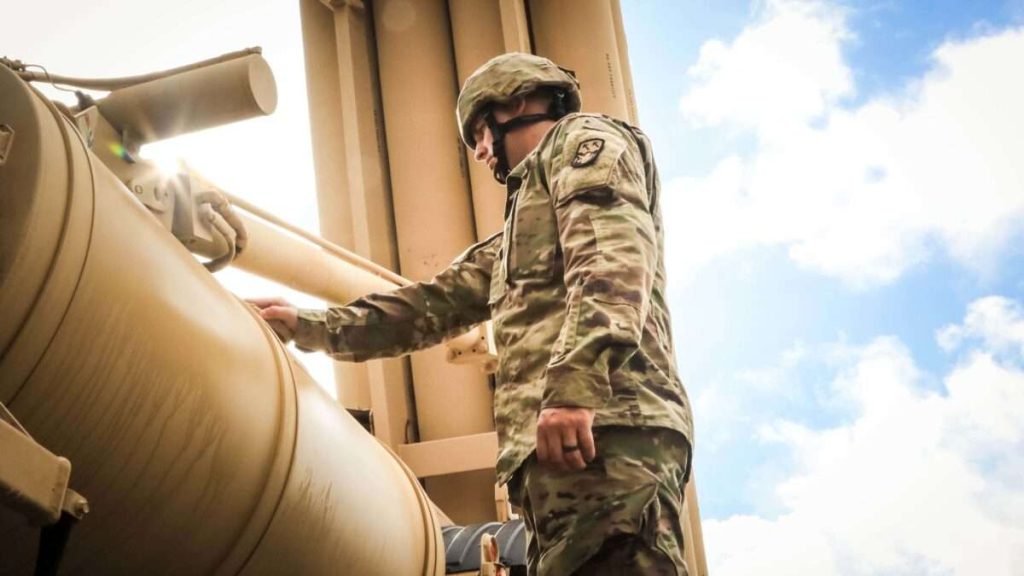The only times Congress has ever invoked the War Powers Act to stop a war were when Donald Trump was president. In 2019, both houses of Congress passed a resolution demanding the U.S. forces get out of the Saudi-led war in Yemen. In 2020, both houses voted to stop “hostilities against the Islamic Republic of Iran…unless explicitly authorized by a declaration of war or specific authorization for use of military force.” Although Trump vetoed both, there was bipartisan support for asserting Congress’ powers over war and peace.
Now that President Joe Biden is sending U.S. troops to help Israel fight Iran, many members of Congress seem fine with unauthorized military action. And like the earlier push for restraint, this newfound hawkishness is bipartisan. Rep. Matt Gaetz (R–Fla.) spoke positively about Biden’s troop deployment and Sen. Richard Blumenthal (D–Conn.) openly endorsed it. Both had voted for the 2020 war powers resolution. Other war powers critics remained silent.
Rep. Scott Perry (R–Pa.) was one of the rare public skeptics of the deployment. “I’m happy that we’re providing Israel the defensive equipment, munitions, et cetera,” he said on an online talk show. “I don’t know why American service members need to be on the ground there in the combat zone…America is going to be drawn more into this war unnecessarily.”
Four Democratic congresswomen—Cori Bush of Missouri, Alexandria Ocasio-Cortez of New York, Ilhan Omar of Minnesota, and Rashida Tlaib of Michigan—also called on the Biden administration to end military support for Israel without mentioning the troop deployment specifically.
On Sunday, the Pentagon announced the deployment of around 100 troops to operate a Terminal High Altitude Area Defense (THAAD) missile battery in Israel. The deployment comes as Israeli leaders publicly plan to attack Iran as part of a tit-for-tat between the two countries over the past few months. The Iranian government has implied that if Israel attacks, it will retaliate without regard to whether U.S. troops are in the way.
And the threat to American lives is not just in case of an Iranian attack. A few hours after the THAAD deployment was announced, the Lebanese militia Hezbollah killed four Israeli soldiers and wounded dozens with a drone strike on an army base deep in Israeli territory.
The War Powers Act requires the President to notify Congress about sending troops “into hostilities or into situations where imminent involvement in hostilities is clearly indicated by the circumstances” within 48 hours, and sets a 60-day time limit to win congressional approval for the deployment. It also requires a separate notification if any U.S. troops are sent to another country “equipped for combat.”
Although Congress provides weapons and funding to Israel, it has not voted to authorize or fund the direct use of American troops to defend Israel, according to former U.S. State Department lawyer Brian Finucane, now an adviser at the nonprofit International Crisis Group.
The Biden administration is “deploying troops to Israel, which is waging war on multiple fronts, with the anticipation that they’ll have to potentially defend against Iranian missile strikes,” Finucane says. “It’s pretty hard to argue not only that U.S. forces weren’t introduced into a foreign country equipped for combat, but that they’re not being introduced into hostilities or imminent hostilities.”
Hard to argue, but some members of Congress are trying anyway. “I strongly welcome the administration’s decision,” Blumenthal, the Democratic senator, told NBC. “The air defense system is to be used for defense only.”
Back in 2020, he had struck a very different tone about taking military action without a vote from Congress. A congressional vote “gives the people who will have to sacrifice in that war a voice in the decision,” Blumenthal said on the Senate floor. “It gives a voice to the experts in this body who may have a perspective and a wisdom [sic] on these topics that is a useful check on the executive branch. And let us not forget that military actions conducted without a strategy, without consent of the American people, have real consequences for all who serve our nation in uniform.”
Gaetz, the Republican congressman, defends Biden’s deployment in the same terms that Blumenthal did. “I think our troops are already there. I consider THAAD force protection,” Gaetz said in an email. There has been a U.S. military radar station in Israel since 2017, and the Pentagon deployed advisers to Israel in late 2023 to share surveillance data with the Israeli military.
Those earlier troop deployments, however, were not “equipped for combat,” Finucane points out. “These THAAD batteries are not being deployed to protect U.S. forces. They’re being deployed to protect Israel,” he adds in response to Gaetz’s statement. “You can debate the policy merits of it, this is simply the reality. And the administration really isn’t pretending otherwise.”
Others simply avoided addressing the topic.
In 2018, Sens. Chris Murphy (D–Conn.), Bernie Sanders (I–Vt.), and Mike Lee (R–Utah) introduced the war powers resolution over U.S. involvement in Yemen. U.S. forces, which were refueling Saudi planes and helping the Saudi military plan operations, were at far less risk of attack than the American troops deployed to Israel today.
“Here is the bottom line. If the President or members of Congress believe that support for the war is in the U.S. interests and that we should be involved in it, then let them come before Congress, let them make their case, and let the Congress vote,” Sanders said during a 2018 press conference introducing the resolution.
“Especially when American lives are being put on the line and American resources are being devoted toward a particular conflict, the American people have every right and every reasonable expectation that their elected representatives in Congress will debate this and we’ll discuss this rather than simply allowing it to happen,” Lee added at that press conference.
In 2020, Murphy made an impassioned floor speech about war powers. “We’re listening to the administration and its advocates bully Congress and the American people into avoiding this debate with the suggestion that by questioning U.S. military objectives overseas, we’re somehow hurting the troops,” he said. And in 2021, he proposed a war powers reform that would define “hostilities” as “any situation involving any use of lethal or potentially lethal force by or against United States forces.”
Neither Sanders, nor Lee nor Murphy have commented on the THAAD deployment. None of them responded to Reason‘s request for comment.
Like Murphy, some lawmakers continued their war powers advocacy into the Biden administration. But they have been a lot more willing to criticize hypothetical combat than the actual combat in Israel that U.S. forces are being asked to prepare for.
Sen. Tammy Duckworth (D–Ill.) had been a major supporter of the 2020 war powers resolution, and after pro-Iran guerrillas killed three American troops on the Syrian-Jordanian border earlier this year, she slammed Republicans’ calls for retaliation.
“If Republicans really want to risk war with Iran, they owe it to our troops to bring an Authorization for Use of Military Force to the floor,” Duckworth said. “Instead of hiding behind social media accounts and television interviews, bring that debate to this chamber so that we can actually fulfill our duty and begin the serious business of considering the merits and drawbacks of such a conflict.”
She did not comment on the THAAD deployment, and her office declined to speak to Reason on the record.
Gaetz, who called the THAAD deployment a form of “force protection,” had come out hard against a previous U.S. deployment to Palestinian territories under Israeli supervision. Earlier this year, the U.S. military moved to set up a temporary pier off the coast of Gaza to deliver food aid via the Israeli-occupied Netzarim Corridor. (It was taken apart over the summer.) At an April 2024 hearing, Gaetz grilled Defense Secretary Lloyd Austin about the danger that the pier could come under attack.
“When Americans think boots on the ground, they think Americans in harm’s way or engaged actively in a conflict. You guys seem to be sort of saying that boots on a pier, connected to the ground, connected to service members shooting into Gaza doesn’t count as boots on the ground,” Gaetz said. “I think you’re gonna find that the American people have a different perspective on that. And if we’re gonna have people shooting into Gaza, we probably should have a vote on that, pursuant to our war powers.”
Wars supported by the other party are easy to oppose. So are hypothetical, future wars. It’s much harder to have this debate once American soldiers are on the ground, about to take fire. Yet that’s when the debate matters most.
The post The Congressmen Who Stopped Caring About War Powers After Trump Left Office appeared first on Reason.com.






